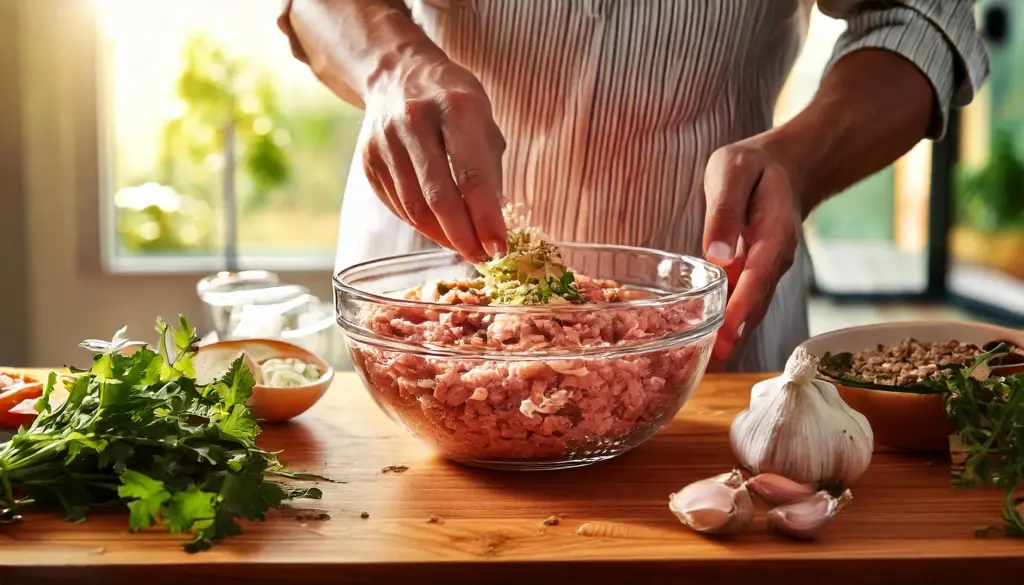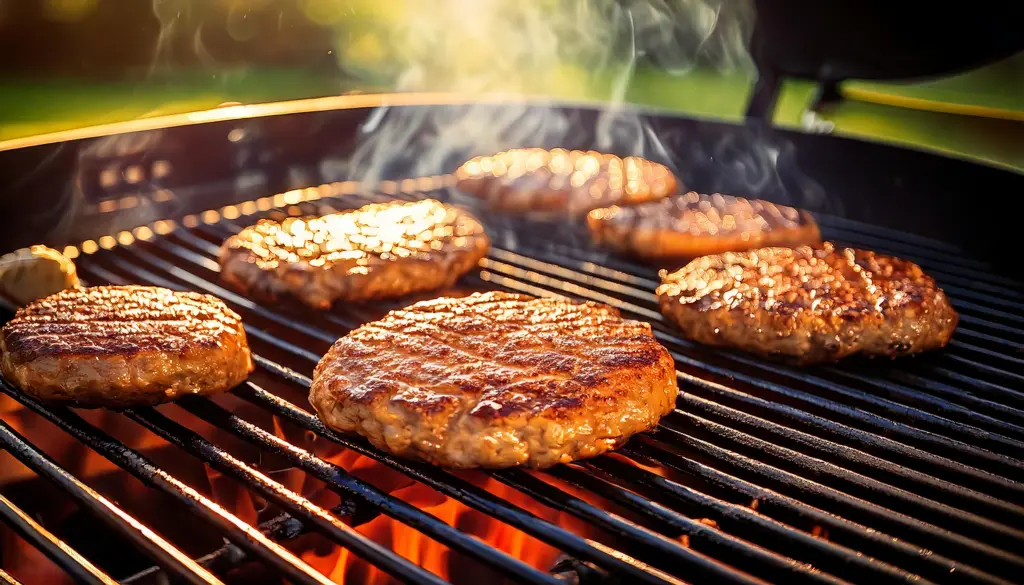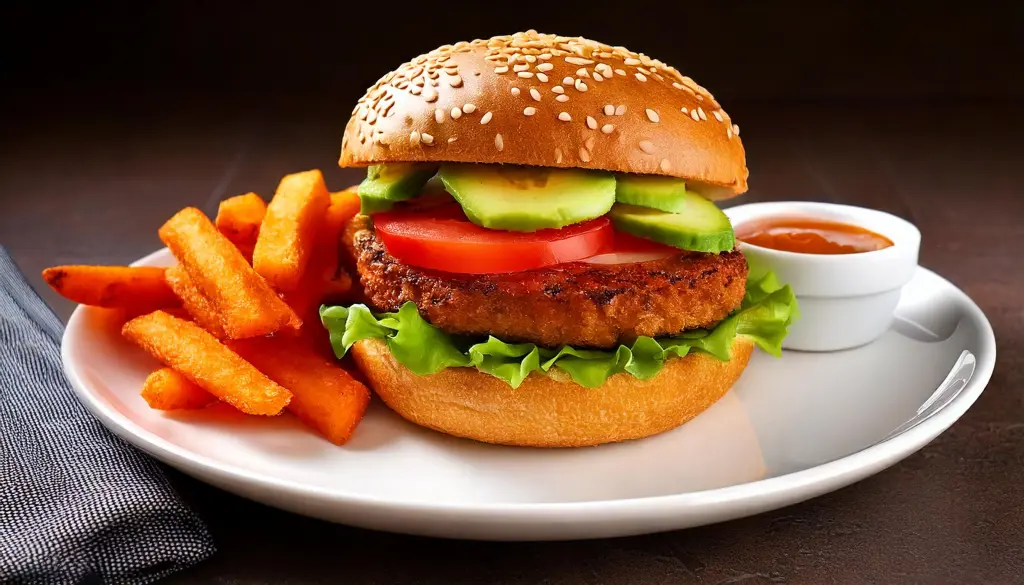Turkey burgers are a healthier and equally delicious alternative to beef patties, but cooking them just right can feel like an art. Knowing what temperature for turkey burgers ensures they’re juicy, flavorful, and, most importantly, safe to eat. In this guide, we’ll explore the ideal temperature, cooking tips, and common mistakes to avoid, making you a pro at serving up perfectly cooked turkey burgers every time.
The Importance of Cooking Turkey Burgers to the Right Temperature
Why Cooking Turkey Burgers to the Right Temperature is Crucial
Cooking turkey burgers to the proper temperature is more than a suggestion; it’s a necessity. Why? Because turkey, unlike other meats, must reach a specific heat to kill harmful bacteria like salmonella. Trust me, no one wants to serve a burger with a side of food poisoning!
But it’s not just about safety it’s about taste too. When turkey burgers are undercooked, they’re unsafe. Overcook them, and you’ll end up with dry, crumbly patties that feel like chewing on cardboard. The trick is to strike the perfect balance between safety and flavor by sticking to the recommended internal temperature of 165°F (spoiler alert we’ll dig deeper into that soon).
Food Safety Concerns
Let’s talk turkey literally. Ground turkey has a higher risk of carrying bacteria compared to whole cuts of meat. This is because the grinding process spreads bacteria throughout the meat, unlike whole cuts where contamination is usually surface-level. According to the USDA safe internal temperature guidelines, 165°F is the magic number that ensures all bacteria are destroyed, making your burger not only tasty but also safe to devour.
Cooking turkey burgers to this temperature eliminates worries about salmonella and ensures your family enjoys mealtime without any “uh-oh” moments. (If you’re curious, check out this resource on USDA safe internal temperature guidelines.)
Achieving Juiciness and Texture
Now, let’s not forget about taste. One of the biggest struggles with turkey burgers is keeping them moist. Overcooking a turkey burger is like leaving your phone in the sun completely avoidable and always regrettable.
By hitting the sweet spot of 165°F, you’ll lock in all the juices without leaving any pink in the center. A properly cooked turkey burger should be tender, slightly firm, and bursting with flavor, not resembling the Sahara Desert. Cooking it at the right temperature allows you to enjoy all the health benefits of turkey without sacrificing taste or texture.
What is the Best Temperature for Turkey Burgers?
The Ideal Internal Temperature for Turkey Burgers
The golden rule for cooking turkey burgers is to reach an internal temperature of 165°F (74°C). This isn’t just a suggestion; it’s backed by the USDA to ensure your turkey burger is free of harmful bacteria. A meat thermometer is your best friend here. Insert it into the thickest part of the patty, avoiding the grill or pan, for an accurate reading.
Unlike beef burgers, which some people prefer medium or even rare, turkey doesn’t give you that option it’s all or nothing. Cooking it to 165°F ensures safety while maintaining its juicy flavor.
Why 165°F is the Magic Number
Hitting precisely 165°F works because this is the temperature at which bacteria like salmonella and E. coli are destroyed. It’s like flipping the safety switch on your meal. Cooking it below this temperature might leave harmful bacteria lurking, while going too far above can lead to a dry, less enjoyable texture.
Interestingly, the USDA temperature recommendation applies to all poultry, not just turkey. So, the next time you’re cooking chicken or ground turkey, keep this number in mind.
Surface Cooking Temperature for Turkey Burgers
While the internal temperature is critical, the heat level of your grill or stovetop plays an equally important role. For the best results:
- Set your grill to medium-high heat (around 375°F to 400°F).
- On the stovetop, use medium heat for even cooking.
These settings allow the patties to cook through evenly without burning the outside or leaving the inside undercooked.
How to Avoid Overcooking
We’ve all been there you’re trying to make sure your turkey burger is cooked through, and the next thing you know, it’s a dry hockey puck. The secret is to remove the patty from the heat as soon as it hits 165°F. Don’t let it sit on the pan or grill for “just a minute longer,” or you’ll lose precious moisture.
Carryover cooking (where the heat continues to rise slightly even after you’ve removed the burger from the heat source) will naturally finish the cooking process.
How to Measure the Internal Temperature of Turkey Burgers
Using a Meat Thermometer
To get that perfect 165°F, a meat thermometer is your MVP. It takes the guesswork out of cooking and ensures that your turkey burger isn’t overcooked or, worse, undercooked.
- Choose the Right Thermometer: A digital instant-read thermometer is the best option for quick and accurate results.
- Insert it Properly: Place the thermometer in the thickest part of the patty, avoiding contact with the pan, grill, or any cheese or toppings. This ensures you’re measuring the meat itself.
- Check Multiple Patties: If you’re cooking more than one burger, test the temperature of each, especially if the patties vary in size.
When to Measure the Temperature
Timing is key! Start checking the internal temperature about 2-3 minutes before you expect the burgers to be done. For example:
- On the grill: Check at the 8-10 minute mark if cooking over medium-high heat.
- On the stovetop: Start testing after 7-8 minutes of cooking on medium heat.
Checking early prevents overcooking while giving you enough time to adjust if the patties need more cooking.
Alternative Methods to Gauge Doneness
What if you don’t have a meat thermometer? While less accurate, there are other ways to check if your turkey burgers are cooked through:
- Visual Clues:
- The patties should be a light brown or golden color on the outside.
- There should be no visible pink in the center.
- Texture Test:
- Press the center of the burger with a spatula or tongs. A fully cooked turkey burger feels firm but not rock-hard.
- Juice Test:
- Cut into the burger slightly. If the juices run clear, it’s likely done. If they’re pink or cloudy, it needs more time.
Keep in mind, though, these methods aren’t as foolproof as using a thermometer. To ensure safety, nothing beats the precision of checking for 165°F.
Tips for Consistent Cooking
- Uniform Patty Size: Form your patties to an even thickness to avoid hot spots. Thicker areas take longer to cook, while thinner sections might overcook.
- Don’t Press the Patties: Resist the urge to smash your burgers with a spatula it squeezes out the juices, leaving you with a dry burger.
- Flip Once: Flipping your burger just once during cooking ensures even heat distribution without drying it out.
Tips for Cooking Turkey Burgers Perfectly Every Time

Choosing the Right Ground Turkey
Before you even think about cooking, choosing the right type of ground turkey is crucial. Not all ground turkey is created equal!
- Opt for Ground Turkey with Some Fat: Lean turkey (93% lean, 7% fat) is ideal for turkey burgers. It has enough fat to keep the burgers juicy while still being healthy. Ultra-lean turkey (99% lean) often leads to dry and crumbly patties.
- Fresh or Frozen?: Fresh ground turkey tends to have better texture and flavor. If using frozen, make sure it’s fully thawed before cooking for even heat distribution.
Seasoning Your Turkey Burgers
Turkey meat has a mild flavor, which means it’s a blank canvas for seasoning. To make your turkey burgers mouthwatering:
- Add salt, pepper, garlic powder, onion powder, and paprika for a classic flavor.
- Mix in a bit of Worcestershire sauce for depth (skip this if you want to avoid sauces with preservatives).
- Toss in fresh herbs like parsley or cilantro for extra freshness.
Pro Tip: Don’t overmix the meat handling it too much can make the texture dense and tough. Gently combine the ingredients until just blended.
Cooking Methods for Turkey Burgers

Turkey burgers are versatile and can be cooked in several ways, depending on what’s convenient for you:
- On the Grill
- Preheat the grill to medium-high heat (375°F–400°F).
- Oil the grates to prevent sticking.
- Cook the patties for about 4-5 minutes per side, flipping only once. Use a thermometer to check for 165°F internally.
- On the Stovetop
- Heat a skillet over medium heat. Add a tablespoon of olive oil or butter for extra moisture.
- Cook each side for about 4-6 minutes. Again, confirm doneness with a thermometer.
- In the Oven
- Preheat your oven to 375°F. Line a baking sheet with parchment paper or aluminum foil.
- Bake for 20-25 minutes, flipping halfway through. Check the internal temperature before serving.
- In an Air Fryer
- Preheat the air fryer to 360°F. Lightly grease the basket.
- Cook for about 12-15 minutes, flipping halfway. Ensure the burgers reach 165°F before serving.
Tips for Juicy Turkey Burgers
Avoiding dry turkey burgers is easier than you think:
- Don’t Overcook: As soon as the internal temperature hits 165°F, remove the patties from the heat.
- Use a Binder: Add breadcrumbs, panko, or even grated zucchini to the mix. This helps retain moisture and prevents the patties from falling apart.
- Cover While Cooking: When cooking on the stovetop, cover the skillet with a lid to trap steam and keep the burgers moist.
Serving Suggestions
Turkey burgers pair wonderfully with a variety of toppings and sides:
- Toppings: Try avocado slices, melted cheese, sautéed onions, or a dollop of Greek yogurt sauce.
- Sides: Serve with sweet potato fries, a fresh side salad, or grilled vegetables for a wholesome meal.
To take your turkey burger skills to the next level, why not explore more ways to prepare them? If you’re curious about how long turkey burgers take in the air fryer, check out our detailed guide here. For tips on achieving juicy and crispy results when air frying turkey, don’t miss this comprehensive article on air fryer temperatures here. And if you’re ready to try a quick and delicious recipe, our step-by-step turkey burger air fryer recipe here is a must! These resources will help you master every method of cooking turkey burgers with ease.
Common Mistakes to Avoid When Cooking Turkey Burgers

1. Cooking at the Wrong Temperature
One of the biggest mistakes is not maintaining the right cooking temperature. If the grill or stovetop is too hot, the outside of the burger will char while the inside remains undercooked. If it’s too low, you risk drying out the patty while waiting for it to cook through.
- Ideal grill temperature: 375°F to 400°F.
- Stovetop heat: Medium.
Stick to these guidelines, and don’t forget to use a thermometer to ensure the burger reaches the 165°F internal mark.
2. Skipping the Thermometer
Eyeballing doneness might work for beef burgers, but not for turkey. Cutting into the patty to check its color can release precious juices, leaving you with a dry burger. Always rely on a meat thermometer for accuracy.
3. Overmixing the Meat
Overworking the ground turkey while mixing the seasoning can make the meat dense and tough. Treat the meat gently! Just fold in the ingredients until combined, then form your patties with light hands.
4. Pressing the Patties While Cooking
We’ve all been tempted to press down on the burgers with a spatula. Resist the urge! Pressing squeezes out the juices, making the burgers dry. Let the patties cook undisturbed except for one flip during cooking.
5. Not Adding Enough Fat or Moisture
Turkey is naturally lean, so it needs a little help to stay juicy. Adding ingredients like:
- Breadcrumbs or panko for moisture retention.
- Olive oil or grated vegetables like zucchini for extra hydration.
- An egg as a binder to keep the mixture from falling apart.
6. Overcooking the Patties
Turkey burgers don’t benefit from extra time on the grill or stove. Remove them as soon as they hit 165°F no exceptions! Overcooking will zap the patties of their natural moisture, leaving them dry and crumbly.
7. Forgetting to Rest the Burgers
Just like steaks, turkey burgers need to rest for a couple of minutes after cooking. This allows the juices to redistribute, ensuring every bite is juicy and flavorful.
8. Not Greasing the Cooking Surface
Turkey patties are prone to sticking because of their low-fat content. To avoid a mess:
- Oil the grill grates or pan before cooking.
- Use non-stick pans or baking sheets lined with parchment paper if baking.
9. Uneven Patty Thickness
If your patties are thicker in the middle than on the edges, they’ll cook unevenly. Flatten the patties slightly and ensure an even thickness throughout for consistent cooking.
10. Skipping the Seasoning
Turkey has a mild flavor and absolutely needs seasoning to stand out. Don’t just sprinkle salt on the surface season the meat mixture thoroughly. Add spices, herbs, and a touch of your favorite sauce for that wow factor.
FAQs: Turkey Burgers and Cooking Temperatures
1. What temperature should turkey burgers be cooked to?
Turkey burgers should be cooked to an internal temperature of 165°F (74°C). Use a meat thermometer to check the temperature at the thickest part of the patty to ensure it’s fully cooked and safe to eat.
2. How do I keep turkey burgers from drying out?
To keep turkey burgers juicy, avoid overcooking them. Add moisture-rich ingredients like grated zucchini or a little olive oil to the mixture, and remove them from the heat as soon as they reach 165°F.
3. Can I cook turkey burgers in the oven?
Yes, you can bake turkey burgers in the oven. Preheat to 375°F, place the patties on a lined baking sheet, and cook for 20-25 minutes, flipping halfway through. Always check for a 165°F internal temperature before serving.
4. How do I know if my turkey burger is fully cooked?
The most reliable way is by using a meat thermometer. Once the internal temperature reads 165°F, your turkey burger is fully cooked. Avoid relying on color alone, as turkey can sometimes look done even if it’s undercooked.
5. Can I grill frozen turkey burgers?
Yes, you can grill frozen turkey burgers, but the cooking time will be longer. Set the grill to medium heat and cook the burgers for 8-10 minutes per side, checking the internal temperature frequently. Ensure the patties reach 165°F before serving.
6. Are turkey burgers healthier than beef burgers?
Turkey burgers are generally leaner and contain less saturated fat than beef burgers, making them a healthier option. However, it’s essential to choose the right balance of lean meat and fat to avoid a dry patty.
7. Why do my turkey burgers fall apart?
Turkey burgers may fall apart if there’s no binder in the mixture. Adding an egg or breadcrumbs helps hold the patties together. Overmixing the meat can also weaken its structure, so handle it gently when forming the patties.
8. Can I freeze cooked turkey burgers?
Yes, cooked turkey burgers can be frozen. Let them cool completely, wrap them individually in plastic wrap or foil, and store them in an airtight container. Reheat in the microwave or oven until they’re hot all the way through.
Conclusion: Mastering the Art of Turkey Burgers
Cooking the perfect turkey burger isn’t as tricky as it seems, as long as you follow a few key guidelines. From choosing the right ground turkey to using a thermometer to hit that all-important 165°F internal temperature, every step plays a part in achieving juicy, flavorful burgers. Avoiding common pitfalls, like overmixing the meat or skipping essential seasonings, makes all the difference.
Turkey burgers are not only a healthier alternative to traditional beef burgers but also a blank canvas for culinary creativity. Whether you’re grilling, baking, or pan-frying, you can create a satisfying meal with just a few simple tweaks and tricks.
Now, it’s time to put your newfound knowledge to work get creative with toppings, pair them with delicious sides, and enjoy a turkey burger that’s moist, flavorful, and cooked to perfection!
